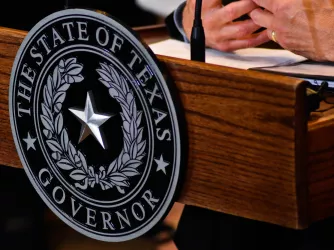Table of Contents
Everything Is Bigger in Texas, Including Violations of the First Amendment

There have been numerous media accounts of the current threat to academic freedom and faculty free speech in Wisconsin. This attention is appropriate, as my colleague Peter Bonilla explained here on The Torch last month. But there appears to have been very little coverage of Texas’s HB 1295, which quietly became law on June 19.
The bill states:
(a) In any public communication the content of which is based on the results of sponsored research, a faculty member or other employee or appointee of an institution of higher education who conducted or participated in conducting the research shall conspicuously disclose the identity of each sponsor of the research.
This seemingly innocuous provision threatens academic freedom and implicates the First Amendment in several significant ways. First, and most obviously, it compels speech. The new law requires professors employed at public institutions of higher education to “conspicuously disclose” their funding source any time they publicly discuss research that received more than 50 percent of its funding from an entity other than the university itself.
While transparency in funding research may generally be a good thing, mandatory disclosure any time professors engage in “public communication” about their research is overbroad and vague, and may be underinclusive to boot. The bill defines “public communication” as:
oral or written communication intended for public consumption or distribution, including:
(A) testimony in a public administrative, legislative, regulatory, or judicial proceeding;
(B) printed matter including a magazine, journal, newsletter, newspaper, pamphlet, or report; or
(C) posting of information on a website or similar Internet host for information.
Under this language, professors may feel compelled to disclose their funding sources any time they discuss their research publicly. Would class lectures or presentations at academic conferences be considered communications intended for public consumption under the new law? And what happens when a professor conducts an interview with a reporter and the disclosure does not make it into the final published story? These are just two questions that illustrate the new law’s overbreadth and its vagueness.
The chilling effect that HB 1295 may have on academics should not be understated. Professors who are unsure of the new law’s applicability in the classroom or when discussing research at academic symposiums open to the public may just choose to stay silent. The provision could also chill private actors’ willingness to fund research, to the ultimate detriment of their respective fields of study.
HB 1295 may also suffer from underinclusiveness. If the government has an interest in transparency when it comes to privately funded research, why are academic researchers targeted by this bill while researchers who aren’t associated with academia are exempt? Why must researchers at public colleges make these disclosures while those at private institutions are exempt? Because it does not apply to non-academics or to academics at private institutions, the legislation is arguably underinclusive if its justification for compelling speech is transparency. After all, the new law exempts from disclosure research funded by the public institution of higher education itself.
The Lone Star State made a Texas-sized mistake when it passed HB 1295. Texans concerned with academic freedom and free speech on campus should start getting to work on its repeal.
Recent Articles
FIRE’s award-winning Newsdesk covers the free speech news you need to stay informed.

Gov. Greg Abbott’s order ‘hardening state government’ against China is dangerously hard to parse

Right, left, and in-between: Can we bring our differences to the table?

From the UK to Germany to Singapore: Police are watching what you post
